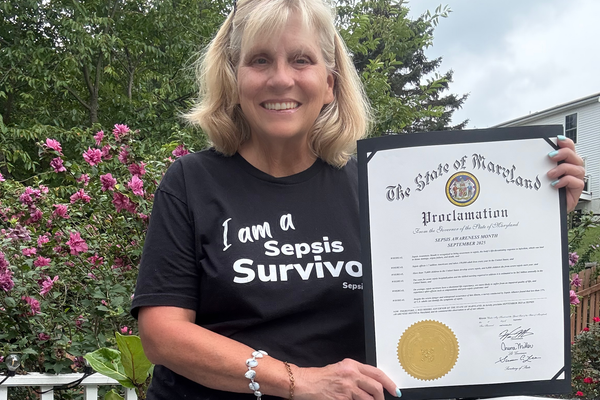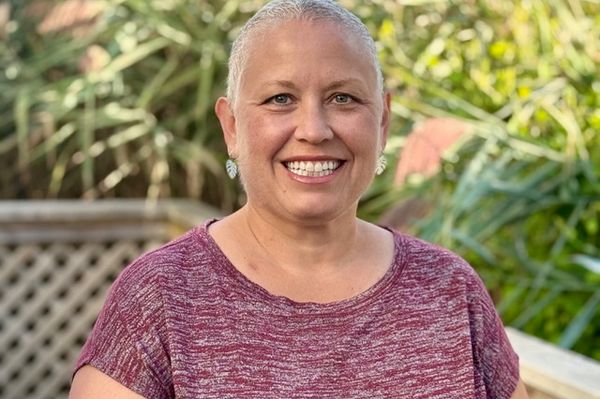
This story is part of our Real Women, Real Stories series, documenting the lived experiences of women along their health journeys. Please always consult your health care professional with personal concerns or questions.
My virus-induced anxiety began on March 9, when my roommate came home from a trip to Seattle. I was scared, even though in Minnesota, we only had a handful of cases. I wondered if I was overreacting by spraying Lysol disinfectant on every surface in our house. I just didn't know how to protect myself from the unseeable. Because I'm immunocompromised, I'm one of the millions of Americans for whom COVID-19 could be deadly.
A few days later I felt heavy fatigue. At first, I thought it was my ulcerative colitis (UC) acting up. I've had the auto-immune condition for a decade; it flares up with debilitating, invisible symptoms like fatigue and internal pain, caused by active ulcers in my large intestine. At times, I've been in remission, where I've been able to exercise intensely and not burnout after a few hours of work. Today, I am in near-remission, with occasional flare symptoms. But when I started to lose my breath talking on the phone and going on slow walks, I knew something was different. The next day, I got my breath back and felt better.
Then on March 21, my symptoms returned, worse than before. My fatigue was constant, and my heart rate sky-rocketed when I walked up a flight of stairs. My muscles felt strong, and I didn't consider myself "out of shape"––a dreaded phrase for chronic illness patients because fatigue is just another symptom that cannot be seen, impossible to explain to others. As a person with an invisible chronic illness, I'm an expert at hiding the discomfort in my body, because a varying range of discomfort is my normal. Whenever I feel something different than my usual fluctuating pain and fatigue, I worry. This time, I felt fear rising inside my chest.
I messaged the GI nurses who help me manage my UC. "Go to OnCare.com and feel better," one said. I took the online survey to determine whether I should get tested for COVID-19. The conclusion was yes, because I take an immunocompromising drug. But the next day I started feeling better again, so I held off on the test.
This rollercoaster of symptoms continued for four days, when I woke with a sporadic dry cough, fatigue, and shortness of breath. I needed to be examined, at the very least to ease my mind. I didn't like this terrifying ride.
I soon learned that fear was a very real symptom of COVID-19.
That morning, I called a triage nurse, who (it turned out) gave me incorrect information. She said that all the drive-through testing centers in Minneapolis were closed due to a lack of tests (correct). She then directed me to the local emergency room, which she claimed was the only place they were testing people (incorrect).
At the hospital, all the units were blocked off. You had to see a triage nurse in order to enter. Tables barricaded the entrance to the emergency room. The nurses in the lobby asked me some questions, then sent me to a separate "respiratory center," an urgent care building which had been ENTIRELY converted into a COVID-19 testing center. On March 25, we had four of these centers in the Minneapolis area.
I left the hospital and drove 20 minutes to the center. As a person with UC, I've been given wrong information by healthcare professionals dozens of times, so I wasn't too perturbed by being sent to another clinic. When I'm scared of what's happening inside my body, I go into a strictly action-oriented mode. I go until I find answers.
Upon arriving at the clinic, I was greeted by a nurse covered in essentially a hazmat suit, no exposed skin. She walked toward me as I came closer to the building, as if to shield the entrance with her body. I told her I had an appointment and she let me enter. Inside, the nurses were all covered in survival suits, except some weren't wearing masks. I've seen hundreds of nurses and doctors over the years, and this extreme scene was nothing I'd ever witnessed.
I walked down the halls, hearing muffled laughter. Alone in the exam room, I sat down on a cold chair and tried not to touch anything. The constant buzzing of an air vent in the corner mixed with my palpable anxiety. "What's going on?" I thought. "Do people understand that this entire facility has been converted to a coronavirus test site?" I never would've believed it if I wasn't experiencing it myself.
A nurse came in and told me there weren't enough tests, and despite being immunocompromised and having COVID-19 symptoms, I didn't qualify. The nurses themselves couldn't even get tested as of March 25––only EMS workers, cancer patients, and dialysis patients were eligible. The test felt like a golden ticket that only a few receive, if they are "sick enough." I wasn't one of the lucky ones.
The nurse then directed me to act like I had the virus. To isolate, NOT go to the grocery store, take acetaminophen for my mild fevers, drink lots of fluids, rest, and make sure the air in my home was humid. She did recommend me for a chest x-ray, though. Downstairs, I held my breath while I pushed my chest up to the cold metal plate of the x-ray machine. Luckily, I received a call later saying that my x-ray showed no signs of infection. My fear dissipated slightly.
Today, I'm deeply grateful to have gotten at least some sort of diagnostic test. My mind is more at ease than it's been in weeks. This is important, especially considering the panic rippling through our communities.
My message is this: our hospitals and care centers have changed drastically to address this pandemic. We don't have enough PPE for our healthcare workers, and we don't have NEARLY enough tests for people who are sick. Please, follow the CDC guidelines, and take care of yourself during this crisis.
Kristen Hutchison is a medical writer creating web content for medical providers and patients alike. Approachable rhetoric in science and medicine is what drives her work. She has lived alongside Ulcerative Colitis for over a decade and advocates for dismissed voices in the complex world of healthcare.





